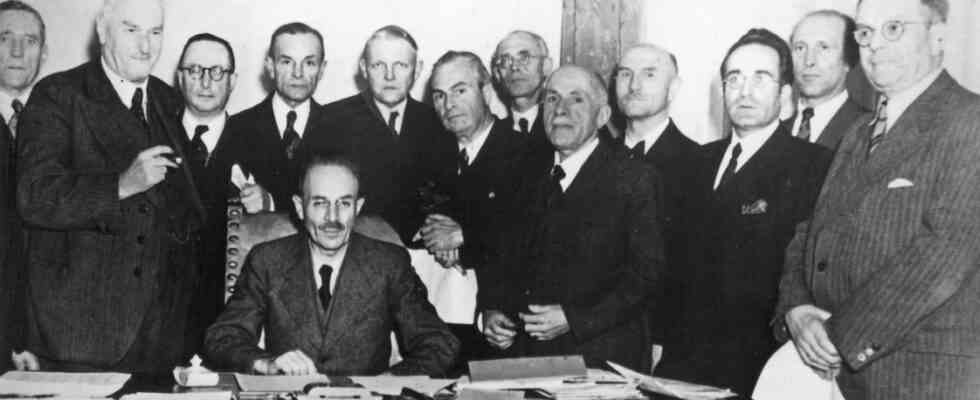It’s not every day that three Bavarian prime ministers mingle with the audience at an event. At the ceremony marking the 75th anniversary of the Institute for Bavarian History in the large auditorium of the Ludwig Maximilians University in Munich, not only the incumbent Markus Söder appeared on Tuesday evening, but also his predecessors Edmund Stoiber and Günther Beckstein.
Of course, there are good reasons for the close ties between top politicians and this institute. Even before the institution was founded in 1947, the Prime Minister in office at the time had his fingers in the pie, only that Wilhelm Hoegner (1887-1980) was not a Christian Socialist, but exceptionally a Social Democrat. The historian Max Spindler (1894 -1986) later reported that Hoegner spontaneously agreed to his proposal in 1946. On February 28, 1947, the official announcement of the establishment of the Institute for Bavarian History was made.
At the time, the decision to set up such an institute was related to a strong desire for federalism. In this regard, the Bavarian SPD at the time was in line with the CSU and even with the extremely federalist Bavarian party. The institute was to create an intellectual and cultural foundation for the modern Free State through in-depth research into Bavarian history and through the training of junior staff, in which a break in civilization like that of the Nazi era should no longer be possible.
In fact, the institute soon developed into a kind of training center for the Free State. Crowds of professors, teachers, general directors, ministers and state secretaries emerged from it, as well as employees in archives, museums, libraries as well as in the media, business and administration. This colorful mixture was also reflected by the 500 or so invited guests from state and society.
The historian Ferdinand Kramer, who has headed the institute for many years together with Dieter J. Weiß and Margit Ksoll-Marcon, held a panel discussion with Prime Minister Markus Söder and Hildegund Holzheid, the former President of the Bavarian Constitutional Court, after the obligatory welcoming ritual Discussants discussed the history of the office of Bavarian Prime Minister, touching not only on historical but also on legal and political aspects in the area of tension between parliamentarism and the Bavarian constitution.
Many guests came to the large auditorium of the Ludwig-Maximilians-University for the 75th birthday of the Institute for Bavarian History.
(Photo: LMU)
Markus Söder was keen to talk and let the audience know how beautiful and liberating the first day is after winning an election and that the second day, when the cabinet has to be formed, proves to be much more stressful. As much as he was enthusiastic about his office, he did not hide the fact that the growing demands that digitization and a demanding parliament brought with it made the prime minister’s life more strenuous than most people can imagine.
Hildegund Holzheid radiated the sovereignty of a lady who once dared to turn down Edmund Stoiber, who had emphatically offered her a ministerial post. She defined the framework in which a constitutional court could operate within the framework of the separation of powers, and explained that the wording of a work such as the Bavarian Constitution was partly outdated and had to be adapted. But this has only happened eleven times so far, while the Basic Law has been changed many more times. Ms. Holzheid had the commendable merit of creating amusement in the audience when she inadvertently slipped out that she had been Prime Minister for almost ten years. . . been.
Teaching and research at the institute resulted in hundreds of dissertations and standard works such as the six-volume manual of Bavarian history and the digital historical encyclopedia of Bavaria. In addition, there is the Historical Atlas of Bavaria, a comprehensive description of the state of Bavaria, which statistically depicts the ownership, rulership and administrative structure of the state from the Middle Ages to the present day and provides the key data for each individual property in Bavaria before the year 1800. This is also due to the fact that Bavaria has a density of sources for the Middle Ages that is unparalleled anywhere else in Europe.
With these sources, the past can be reconstructed in a way that is hardly possible anywhere else in the world. No wonder that many foreign researchers come to Munich to do basic research in the institute, which is only separated from the main Bavarian state archive by a door. As a representative, the French historian Christine Lebeau raved about these research opportunities, which were bundled in a very small space, in the impulse film that was created for the anniversary.
The evening, even if it didn’t seem too lively for one or the other guest, revealed, despite the predominantly older audience, that there was no shortage of young people and junior staff who are eagerly dedicating themselves to researching Bavarian history. And who knows, maybe the ceremony, at which young historians like Alina Schlingensiepen also shone eloquently on stage, will interest one or two 11th graders of the Robert-Koch-Gymnasium in Deggendorf in the Bavarian language, which has been badly neglected in school lessons history sparked. After all, they followed all the speeches and contributions to discussions with an interest that was above average for their age – and not least the honors to the representatives of the House of Wittelsbach who were present, which probably also gave them an idea of why Bavaria and its self-image still stand out a little from the rest Germany.

